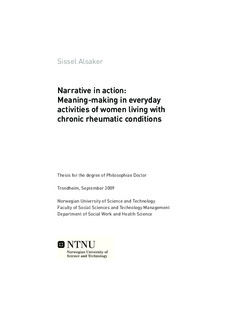Narrative in action: Meaning-making in everyday activities of women living with chronic rheumatic conditions
Doctoral thesis
Permanent lenke
http://hdl.handle.net/11250/267660Utgivelsesdato
2009Metadata
Vis full innførselSamlinger
- Institutt for sosialt arbeid [1367]
Sammendrag
The overall aim of this thesis was to contribute to an understanding of the everyday life of women with chronic rheumatic conditions with an emphasis on how they relate to narrative meaning in their everyday activities. The design conveys an ethnographic approach, including a thorough consideration of conceptual and empirical resources. Narrative traditions were explored as well as existing knowledge of everyday activities. Following on from this exploration, an epistemology and methodology was traced to study ‘meaning in action’ for women living with chronic rheumatic conditions in their local cultures. The findings further show how meaning in action happens in the everyday activities of the participating women. By engaging in their local cultures the women enabled themselves to communicate significant issues of meaning through everyday activities. This thesis contributes to the existing knowledge of everyday living with chronic rheumatic conditions by that it has established a conceptual framework of ‘narrative in action’ and subsequent methodology to study the phenomenon. Further it has shown how everyday action provides interpretative possibilities that enable the women to manage, adjust and negotiate their meanings. The concept of ‘enacted ordinariness’ is established and it is shown how questions of moral worth is embedded in everyday action and how society’s labelling tradition impacts the women’s everyday living. Participation in everyday activities in local cultures is found to be of great value for the women but several contradictions are embedded. Processes of meaning are managed in their everyday action, and they do not set their condition apart from themselves and their way of living. Suggesting that activities produce interaction and communication between individual practices and cultural practices, this thesis also contributes to the ongoing exploration of the concept of occupation/activity. For occupational therapy and occupational science this thesis adds to existing basic knowledge of the temporal quality of activities and their relatedness to narrative and meaning.
